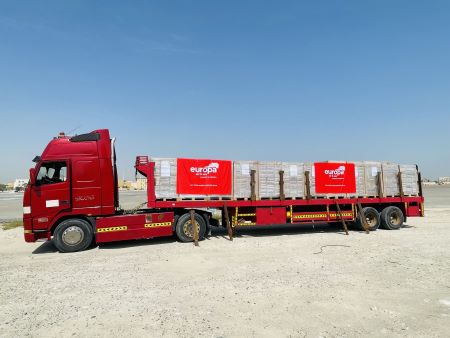ITM Assistant Editor Caitlin Gittins details the latest trends and innovations that are helping to develop and enhance the air cargo sector
Over recent years, the global air cargo industry has experienced a remarkable transformation, driven primarily by technological advancements, changing customer preferences, and global economic shifts. The air cargo industry, which once predominantly served as conduit for the swift transportation of high-value, time-sensitive goods, has undergone a remarkable transformation, influenced heavily by technological advancements, and demands for sustainability efficiency. Whether it is the efficient delivery of perishable goods to meet the changing dietary habits of a growing global population of the seamless transportation of cutting-edge electronics to power our interconnected lives, air cargo has become a critical cog in the machinery of modern life.
In this exclusive feature, I will explore the latest trends and innovations that are capturing the imagination of industry stakeholders and shaping the trajectory of this sector. From the ever-expanding world of e-commerce that has redefined the boundaries of convenience, to the sustainable aviation initiatives aimed at minimising the environmental footprint of cargo transportation, the diverse facets of this evolving industry will be revealed.
E-Commerce and the Air Cargo Boom
Covid-19 had a huge impact upon consumer behaviour, with a huge number of people turning to online retailers to source their goods. As a result of this, the e-commerce industry boomed, with some countries, like Spain, reportedly seeing e-commerce sales increase by as much as 75%. And this industry is not showing any signs of slowing down. Airmacs Aviation confirms:
“As the world becomes increasingly digital, the e-commerce industry is set to grow exponentially in the coming years. Globally, the latest figures suggest a 15% CAGR growth is likely by 2030. In response, the logistics industry has had to look for ways to keep up with this demand, resulting in an uptake in air cargo charters.
“When it comes to e-commerce, air cargo charters are an invaluable asset. According to data released by IATA, 80% of cross-border e-commerce is transported by air. The popularity of online shopping is fuelling this boom, and it shows no signs of waning anytime soon.”
E-commerce has been, and looks set to continue being, the main driving force behind the growth of the air cargo industry. As online shopping platforms and global marketplaces like Amazon, Alibaba, and eBay have created an insatiable demand for quick and efficient transportation of goods, this trend continues to push for investments in cargo aircraft, improved handling facilities and the development of advanced tracking and scheduling systems to meet the growing demand.
Advanced tracking and visibility
As the world goes digital, the demand for real-time tracking and visibility in air cargo has never been so high. Fed by innovations in technology, like the Internet of Things (IoT), enabling the installation of sensors and RFID tags on cargo, providing up-to-the-minute information about location, temperature, humidity and other critical data. Not only does this level of visibility enhance security but also it allows for proactive decision-making, which reduces the risk of delays, theft and damage in transit.
Arviem, provider of real-time cargo monitoring services, explains: “IoT-enabled air freight monitoring technology provides not only location updates but also monitors granular environmental conditions while in the air. This data helps shippers and carriers maintain a chain of command as well as adherence to FSMA and other government regulations.
“Air freight visibility data helps to reduce waste from inefficient processes, document control of the cargo and minimise the risk of loss. It also reduces excessive communication by allowing vested parties to track in real-time. While this information is enough for static goods, cool and cold-chain shipments such as food and pharmaceuticals require temperature monitoring. Other sensitive freight must log conditions such as humidity levels, light exposure and shock at every stage of the journey.”
Sustainable Aviation
The global aviation industry is also under continual pressure to reduce its carbon footprint, and air cargo is no exception. The International Air Transportation Industry (IATA) recognises the importance of sustainability within the air cargo sector, stating that “the development of long-term strategies and investments to achieve a sustainable industry is key to guaranteeing the future of air cargo.”
While innovations in sustainable aviation are emerging, ranging from alternative fuels to more fuel-efficient aircraft designs, air companies are having to invest more actively in research and development to find ways to reduce emissions and improve the overall environmental impact of air cargo transportation.
One air cargo company that has gained attention for its recent green efforts is Etihad Cargo. In a press release, Etihad Cargo revealed that it had “taken strides in its decarbonisation journey to deliver its pledge to achieve net-zero carbon emissions by 2050 through partnerships and industry collaboration.” In addition to signing an airline collaboration agreement with Neste to promote the update of Sustainable Air Fuels (SAF), “the airline became the first international airline to receive a delivery of SAF in Japan and is working with other global suppliers to secure SAF. Etihad Cargo has also joined forces with CEPSA to advance the research and development of SAF and develop energy alternatives.”
Automation and Robotics
Automation and robotics are transforming the way air cargo is handled and processed. Autonomous ground vehicles, such as self-driving forklifts and cargo transporters, are streamlining the movement of goods within cargo terminals. Automated sorting and tracking systems ensure that cargo is processed efficiently and accurately. These innovations not only improve the speed and accuracy of cargo handling but also reduce the risk of human error.
UPS and Aurrigo have recently unveiled a collaborative initiative for the deployment of Auto-Cargo, an autonomous electric vehicle tailored for the transportation of heavy cargo loads to and from aircraft operating within the UPS hub situated at East Midlands Airport, the United Kingdom’s second-largest cargo terminal. This joint endeavour, backed by UK public funding, is aimed at curbing emissions and enhancing safety.
The Auto-Cargo vehicle is capable of moving a standard full-size cargo pallet, two half-size aviation industry standard containers, or Unit Load Devices (ULD), with a combined load capacity of 7.5 tonnes. Additionally, it is designed to tow a fully loaded cargo trailer, further optimising its cargo transportation capabilities. The integration of autonomous technology into this vehicle will liberate security-cleared drivers from cargo handling duties, allowing them to undertake other responsibilities within the airport, all while generating zero tailpipe emissions.
The program receives matched funding from Innovate UK, the UK Government’s innovation agency, and CCAV, with nearly £500,000 in funding. Over the course of 14 months, the two companies will collaborate to develop and conduct a pilot of the Auto-Cargo system at East Midlands Airport.
David Keene, Aurrigo CEO, explains: “This vehicle allows an airfreight operator to help decarbonise and automate its ground operations for lower emissions and greater efficiency. By combining the tractor and trailer into one unit, we save space, which in a busy cargo hub like East Midlands Airport is vital to efficient loading and unloading of aircraft.’
Matt Nicholson, UPS International Director of Automotive Engineering, continues: “Our business is all about delivering parcels efficiently through our global, integrated network. This collaboration will help us do that with increased safety and zero tailpipe emissions, making our airside operation more efficient with a purpose-designed vehicle.’’
Additionally, unmanned aerial vehicles (UAVs), or drones, are becoming increasingly important in the air cargo industry. While their use is still relatively limited, drones show immense potential for last-mile deliveries in remote or hard-to-reach areas. Companies like Amazon and UPS are actively testing and developing drone delivery services, which could provide rapid and cost-effective solutions for delivering small packages and medical supplies.
Amazon, which currently has drone postage in California and Texas, has just announced that it will start using drones to deliver parcels in the UK, with the first destination being revealed in the next few months. The company emphasised its close collaboration with the Civil Aviation Authority (CAA) to comply with regulations, while the government highlighted the potential for this initiative to enhance its understanding of how to securely and safely harness this innovative technology. Not only will this allow for customers to order and obtain a wide range of lighter goods quickly and safely, but their delivery will help to keep the environment clean thanks to the drones’ zero emission technology.
Augmented Reality (AR) and Virtual Reality (VR)
Augmented Reality (AR) and Virtual Reality (VR) technologies are also making substantial advancements in the air cargo sector, fundamentally transforming the way cargo operations are managed, executed, and optimised. These immersive technologies offer a range of benefits that are propelling the industry forward.
One of the most significant contributions of AR and VR is in the realm of training and simulation. These technologies provide cargo personnel with immersive, realistic scenarios that replicate the complexities of cargo handling, equipment operation, and emergency response procedures. Thanks to this training, employees can gain practical experience without the need for real-world practice, significantly reducing the risk of accidents and errors. As a result, cargo personnel are better prepared, more confident, and operate with heightened efficiency and safety.
Moreover, AR and VR have found a valuable application in warehouse operations. Within cargo warehouses, AR has emerged as a game-changer by offering real-time visual guidance to employees, enhancing their ability to locate and manage cargo items efficiently. This visual assistance streamlines order picking and packing processes, leading to a substantial increase in operational efficiency while simultaneously reducing errors.
In the realm of maintenance and repair, VR stands out as an indispensable tool. Maintenance personnel can delve into a virtual environment that faithfully replicates the intricacies of cargo equipment maintenance. Through simulated scenarios, technicians can refine their skills, familiarise themselves with intricate machinery, and become more proficient in handling complex equipment. This not only results in quicker turnaround times for maintenance tasks but also significantly reduces downtime, ensuring cargo operations remain efficient and uninterrupted.
Airports of the Future
As technological innovations continue to filtrate the air cargo sector, major airports around the globe are undergoing vigorous transformations to ensure that they are equipped and prepared to keep up with the latest developments. These innovations include dedicated cargo facilities designed to streamline operations, reduce congestion, and enhance security. Automation and technology solutions, such as robotic cargo handlers and digital tracking, are improving efficiency and accuracy in cargo handling. Sustainability is also a key focus, with airports adopting green practices, including electric ground handling equipment and sustainable packaging. Integration with global supply chains is enhancing coordination with logistics providers and customs authorities. Enhanced security measures, such as AI-based cargo screening, are safeguarding cargo in transit.
Airports are also embracing flexibility in their infrastructure, allowing for easy adaptation to changing demands. Data-driven decision-making is optimizing cargo flows and improving overall operational efficiency. Collaboration and connectivity are fostering stronger partnerships between airlines, cargo carriers, and logistics companies. Enhanced air traffic management systems are reducing delays and improving reliability in cargo transport. Lastly, customised cargo services tailored to the specific needs of various industries, such as pharmaceuticals and perishables, are enhancing the competitiveness of the air cargo sector. These innovations collectively ensure that airports of the future are more efficient, secure and sustainable, meeting the increasing demand for reliable and environmentally responsible cargo transport services.
Ultimately, the air cargo industry is in the midst of a profound and dynamic transformation, shaped by a confluence of technological innovations, sustainability imperatives and shifting market dynamics. This ever-evolving landscape is not only redefining how goods are transported by air but is also presenting a unique set of challenges and opportunities for businesses and organisations operating within this sector.
Looking ahead, the air cargo sector is poised for further growth and evolution. It will need to balance the rising demand for faster, more sustainable cargo transport with the ongoing need for efficiency and cost-effectiveness; and staying attuned to these ever-evolving trends and innovations will be essential for businesses and organisations operating within the industry. Those who successfully adapt to the changing landscape and align their strategies with the imperatives of efficiency and environmental responsibility will position themselves for success in this dynamic and increasingly vital sector.
Read more news and exclusive features in our latest issue here.
Never miss a story… Follow us on:
International Trade Magazine
@itm_magazine
@intrademagazine
Media Contact
Joseph Clarke
Editor, International Trade Magazine
Tel: +44 (0) 1622 823 920
Email: editor@intrademagazine.com







